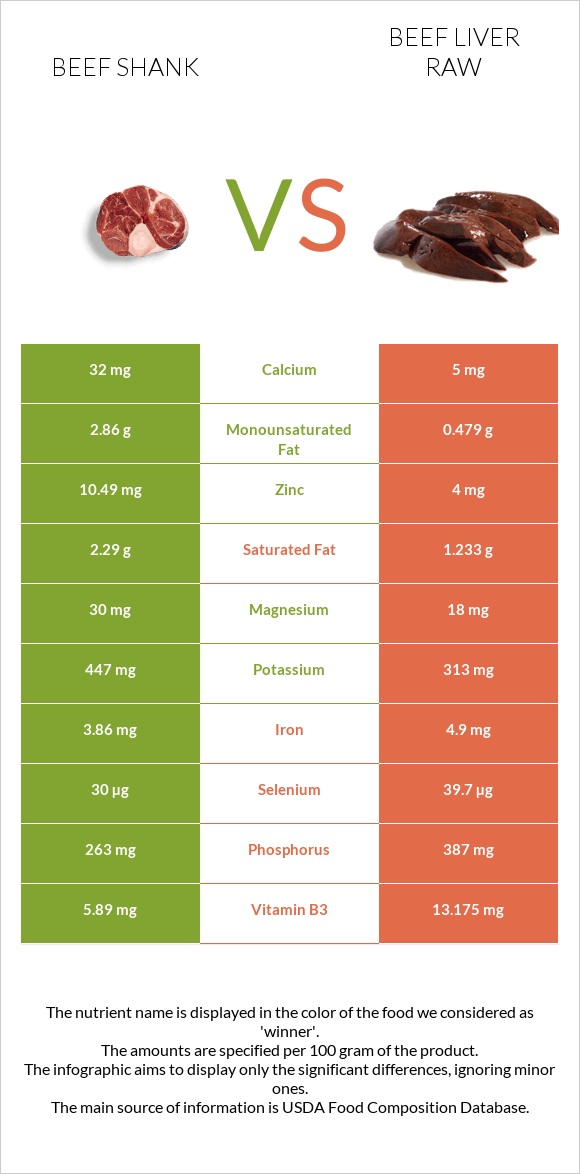Beef shank vs. Beef Liver raw — In-Depth Nutrition Comparison
Compare
Summary of differences between beef shank and beef Liver raw
- Beef shank has more zinc; however, beef Liver raw is higher in vitamin B12, copper, vitamin A, vitamin B2, vitamin B5, folate, vitamin B6, and vitamin B3.
- Beef Liver raw covers your daily need for vitamin B12, 2313% more than beef shank.
- Beef shank has 3 times more zinc than beef Liver raw. While beef shank has 10.49mg of zinc, beef Liver raw has only 4mg.
- Beef shank has less cholesterol.
These are the specific foods used in this comparison Beef, shank crosscuts, separable lean only, trimmed to 1/4" fat, choice, cooked, simmered and Beef, variety meats, and by-products, liver, raw.
Infographic

Infographic link
Mineral Comparison
Mineral comparison score is based on the number of minerals by which one or the other food is richer. The "coverage" charts below show how much of the daily needs can be covered by 300 grams of the food.
| Contains more MagnesiumMagnesium | +66.7% |
| Contains more CalciumCalcium | +540% |
| Contains more PotassiumPotassium | +42.8% |
| Contains more ZincZinc | +162.3% |
| Contains more IronIron | +26.9% |
| Contains more CopperCopper | +5571.5% |
| Contains more PhosphorusPhosphorus | +47.1% |
| Contains more ManganeseManganese | +1450% |
| Contains more SeleniumSelenium | +32.3% |
Vitamin Comparison
Vitamin comparison score is based on the number of vitamins by which one or the other food is richer. The "coverage" charts below show how much of the daily needs can be covered by 300 grams of the food.
| Contains more Vitamin CVitamin C | +∞% |
| Contains more Vitamin AVitamin A | +∞% |
| Contains more Vitamin B1Vitamin B1 | +35% |
| Contains more Vitamin B2Vitamin B2 | +1211.9% |
| Contains more Vitamin B3Vitamin B3 | +123.7% |
| Contains more Vitamin B5Vitamin B5 | +1649.5% |
| Contains more Vitamin B6Vitamin B6 | +192.7% |
| Contains more Vitamin B12Vitamin B12 | +1464.6% |
| Contains more FolateFolate | +2800% |
All nutrients comparison - raw data values
| Nutrient |  |
 |
DV% diff. |
| Vitamin B12 | 3.79µg | 59.3µg | 2313% |
| Copper | 0.172mg | 9.755mg | 1065% |
| Vitamin A | 0µg | 4968µg | 552% |
| Vitamin B2 | 0.21mg | 2.755mg | 196% |
| Vitamin B5 | 0.41mg | 7.173mg | 135% |
| Folate | 10µg | 290µg | 70% |
| Cholesterol | 78mg | 275mg | 66% |
| Choline | 333.3mg | 61% | |
| Zinc | 10.49mg | 4mg | 59% |
| Vitamin B6 | 0.37mg | 1.083mg | 55% |
| Vitamin B3 | 5.89mg | 13.175mg | 46% |
| Protein | 33.68g | 20.36g | 27% |
| Phosphorus | 263mg | 387mg | 18% |
| Selenium | 30µg | 39.7µg | 18% |
| Iron | 3.86mg | 4.9mg | 13% |
| Manganese | 0.02mg | 0.31mg | 13% |
| Vitamin D | 49 IU | 6% | |
| Vitamin D | 1.2µg | 6% | |
| Monounsaturated fat | 2.86g | 0.479g | 6% |
| Saturated fat | 2.29g | 1.233g | 5% |
| Fats | 6.36g | 3.63g | 4% |
| Potassium | 447mg | 313mg | 4% |
| Vitamin B1 | 0.14mg | 0.189mg | 4% |
| Calories | 201kcal | 135kcal | 3% |
| Magnesium | 30mg | 18mg | 3% |
| Calcium | 32mg | 5mg | 3% |
| Vitamin E | 0.38mg | 3% | |
| Vitamin K | 3.1µg | 3% | |
| Polyunsaturated fat | 0.21g | 0.465g | 2% |
| Vitamin C | 0mg | 1.3mg | 1% |
| Carbs | 0g | 3.89g | 1% |
| Net carbs | 0g | 3.89g | N/A |
| Sodium | 64mg | 69mg | 0% |
| Trans fat | 0.17g | N/A | |
| Tryptophan | 0.377mg | 0.263mg | 0% |
| Threonine | 1.471mg | 0.869mg | 0% |
| Isoleucine | 1.514mg | 0.967mg | 0% |
| Leucine | 2.662mg | 1.91mg | 0% |
| Lysine | 2.802mg | 1.607mg | 0% |
| Methionine | 0.862mg | 0.543mg | 0% |
| Phenylalanine | 1.315mg | 1.084mg | 0% |
| Valine | 1.638mg | 1.26mg | 0% |
| Histidine | 1.153mg | 0.629mg | 0% |
| Omega-3 - ALA | 0.007g | N/A | |
| Omega-6 - Gamma-linoleic acid | 0.009g | N/A | |
| Omega-6 - Eicosadienoic acid | 0.01g | N/A | |
| Omega-6 - Linoleic acid | 0.299g | N/A |
Macronutrient Comparison
Macronutrient breakdown side-by-side comparison
Protein:
33.68 g
Fats:
6.36 g
Carbs:
0 g
Water:
58.21 g
Other:
1.75 g
Protein:
20.36 g
Fats:
3.63 g
Carbs:
3.89 g
Water:
70.81 g
Other:
1.31 g
| Contains more ProteinProtein | +65.4% |
| Contains more FatsFats | +75.2% |
| Contains more OtherOther | +33.6% |
| Contains more CarbsCarbs | +∞% |
| Contains more WaterWater | +21.6% |
Fat Type Comparison
Fat type breakdown side-by-side comparison
Saturated fat:
Sat. Fat
2.29 g
Monounsaturated fat:
Mono. Fat
2.86 g
Polyunsaturated fat:
Poly. Fat
0.21 g
Saturated fat:
Sat. Fat
1.233 g
Monounsaturated fat:
Mono. Fat
0.479 g
Polyunsaturated fat:
Poly. Fat
0.465 g
| Contains more Mono. FatMonounsaturated fat | +497.1% |
| Contains less Sat. FatSaturated fat | -46.2% |
| Contains more Poly. FatPolyunsaturated fat | +121.4% |